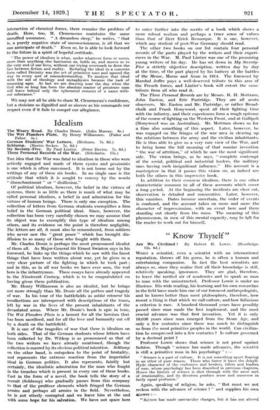Idealism
THE idea that the War was fatal to idealism in those who were actively engaged and made of them cynics and pessimists is one which is often canvassed. It is not borne out by the writings of any of these six books. In no single case is the attitude that which it is sought to convey by the words " disenchantment " or " disillusion."
Of political idealism, however, the belief in the virtues of systems, there is as little as there is much of what may he called personal idealism, a belief in and admiration for the virtues of human beings. There is only one exception. The collection of letters from German students exemplifies a firm belief in the German political ideal. Since, however, the collection has been very carefully chosen we may assume that its object was to exemplify this type of idealism among others, and its evidence on the point is therefore negligible, The letters are all, it must also be remembered, from soldiers who never saw the " great peace " which has brought dis- ffltsion to so many of those who fought with them.
Mr. Charles Douie is perhaps the most pronounced idealist of them all. As Major-General Sir Ernest Swinton says in his foreword, he links up the things which he saw with the finest things that have been written about war, yet he gives us a very clear picture of the fighting in which he took part ; and in this, as in all war books we have ever seen, the real hero is the infantryman. These essays have already appeared in the Nineteenth Century, which is to be congratulated on having given them publication.
Mr. Henry Williamson is also an idealist, but he brings out more strongly than Mr. Douie all the pathos and tragedy of war. In his tour of the battlefields as soldat retourne his recollections are interspersed with descriptions of the traces left by war in the lives of the present inhabitants of the devastated areas. Where Mr. Douie's book is epic in tone, The Wet Flanders Plain is a lament for all the heroism that has been sacrificed, and for all the love and humanity cut off by a death on the battlefield.
It is one of the tragedies of war that there is idealism on both sides. That of the German students whose letters have been collected by Dr. Witkop is as pronounced as that of the two writers we have already mentioned, though the Collection is marred by its obvious political intention. Schlutnp on the other hand, is outspoken to the point of brutality, and represents the extreme reaction from the imperialist ideal in German politics. It also represents, faintly but certainly, the idealistic admiration for the man who fought in the trenches which is present in every one of these books. Cast in the form of a novel, the book tells the story of a recruit (Schlump) who gradually passes from this company to that of the profiteer elements which fringed the German armies and perhaps all armies in the field. Nevertheless, Ile. is not utterly ,corrupted And we leave him at the end with some hope for his salvation. We have not space here
to enter further into the merits of a book which shows a more robust realism and perhaps a truer sense of values than that of Herr Erich Remarque. It is one, however, which any student of post-War Germany should read.
The other two books on our list contain four personal records of the parts played by the writers and their experi- ences in the War. M. Paul Lintier was one of the promising young writers of his day. He has set down in My Seventy- Five a strictly objective description, written day by day at the time, of the part played by his battery at the battles of the Meuse, Marne and Aisne in 1914. The foreword by Marshal Joffre pays a well-deserved tribute to this arm of the French forces, and Lintier's book will extort the same tribute from all who read it.
The Three Personal Records are by Messrs. R. H. Mottram, John Easton, and Eric Partridge. They are all acute observers. Mr. Easton and Mr. Partridge, or rather Broad- chalk and Frank Honywood, spent all their fighting time with the infantry, and their experiences form a rough epitome of the course of fighting on the Western Front, and at Gallipoli (Honywood was an Australian). Mr. Mottram shows us for a time also something of this aspect. Later, however, he was engaged on the fringes of the war area in clearing up the relations between the army and the civilian inhabitants. He is thus able to give us a very rare view of the War, and to bring home the full meaning of that maniac invention " the war of attrition," of which he saw the most significant side. The vision brings, as he says, " complete contempt of the social, political and industrial leaders, the military ones having such insignificant influence." His account is a masterpiece in that it passes this vision on, as indeed are both the others in this impressive book.
In addition to their common idealism, there is one other characteristic common to all of these accounts which cover a long yeriod. At the beginning the incidents are clear cut, observation is detailed and consecutive. Later, however, this vanishes. Dates become uncertain, the order of events is confused, and the account takes on more and more the character of impressionism, with an event here and there standing out clearly from the mass. The meaning of this phenomenon, in men of this mental capacity, may be left for the reader to work out for himself.












































 Previous page
Previous page